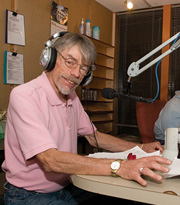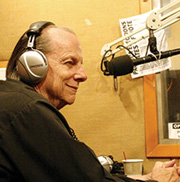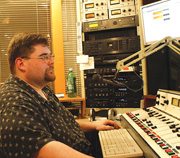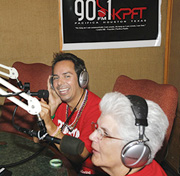That’s a Lot of Talk
‘After Hours,’ the weekly early-morning radio program on KPFT, turns 20.
It’s the wee-est of the wee hours of Saturday night/early Sunday morning. The last-call bell has rung in bars across Montrose, releasing homeward-bound partiers eager for wind-down entertainment. Midnight-shifters are just finishing their rounds, searching for aural stimulation. Entertainers are leaving theaters and nightclubs, seeking one more microphone to promote their next show. A youth in the rural outback huddles in a closet—figuratively and literally—straining to hear the stories and news of an extended family that, for now, is extended beyond his reach. Truckers are rolling down the freeway, cruising the dial, searching for a different flavor of talk other than standard conservative and evangelical talk radio. Inmates—gay and otherwise—in their cells tune their radios to a Houston station, straining for news from another world.
Only one destination can meet all these individuals’ collective needs.
“It’s like this big, messy experiment in life,” Jimmy Carper explains it.

It is After Hours, the venerable queer talk-radio program. This month, as the show turns 20 years old, the aptly named After Hours still broadcasts live every Sunday morning from 1 until 4 a.m. on KPFT 90.1-FM. Carper has been executive producer of the program for most of those two decades.
“I like to think of it as three hours of queer life,” he says.
After Hours was originated by Buddy Johnston, who now lives in San Francisco. Johnston pitched the idea for the program to the radio station, an affiliate of the left-leaning Pacifica network, at a time when gay issues, if talked about on the air at all, were discussed in pejorative terms.
“All these gay men were going home from the bars at 2 o’clock, alone,” Carper recalls. “Buddy decided he was going to fill their living rooms so they wouldn’t feel so alone, and talk about gay life.”
Instead of following a specific format on the fledging show, Johnston would rant about things in the neighborhood, Carper recalls.
“He’d talk about things in the community—inequalities that he would see,” Carper says. “And he spared nobody. He got us into trouble a couple of times!”
1987, the year that Carper joined After Hours, was a rough one, he remembers.
“I had been laid off from my corporate job less than a year earlier,” he explains. “I also had just found out that I was HIV positive.”
A concerned friend told Carper about an unusual radio show that might lift his spirits.
“He said, ‘You’ve got to listen to this. It’s this crazy show in the middle of the night—a queer radio show.'”
A self-described “night owl,” Carper tuned in the very next week.
“I heard actual gay men talking on the radio, and I thought, ‘Oh my god!'”
Fascinated by the concept of hearing his own kind speaking loudly and proudly over the airwaves, Carper got in on the action.
“I was still out of work, so I had nothing to lose,” he recalls. “I went there the very next week, and I’ve been going there every week since.”
When Johnston left Houston for California in 1991 and handed over the reins to Carper, the show’s new executive producer decided it was time to open the mic.
“I didn’t exactly know how to do it, but I knew that I also wanted to have lesbian news and views,” Carper says. “But I’m not a lesbian, so I wanted to have ‘real live’ lesbians.”
Carper also wanted to include the voices of “real live” leather people and “real live” Hispanic people.
“You know, different aspects of the community,” he says.
The show evolved even further when Carper discovered that there is more to the GLBT community than just the G and the L.
“Hey, we’ve got bisexuals and transgenders, too!” he laughs.

Among the revolving correspondents and hosts over the decades are Robert Pagano, Jack Adams, Diane Williams, Judy Reeves, Ray Hill, Rick Hurt (a.k.a. Rainbo de Klown), Jewel Gray, “Big Roy” McCarthy, Sarah DePalma, this writer, and many, many, many more, Carper says.
“There have been a thousand over the years,” he estimates wildly. “And it’s always evolving.”
When After Hours was born, Carper’s current co-producer, Chris Arasin, was “an innocent teenager hiding away in the far, far suburbs of Houston,” Arasin says.
After becoming a faithful listener, Arasin soon ventured into the Lovett Boulevard studio, volunteering as a production assistant.
“I was getting a little long in the tooth anyway, so I needed to get somebody newer in here as a voice of authority,” Carper, who is 59, says. “I once heard somebody refer to After Hours as “The Jimmy Carper Show.” I just panicked, because that is so not what I want. And Chris has worked out so well.”

Arasin says he cannot pin down when he officially joined the crew, but credits OutSmart and an adult bookstore for turning him on to After Hours .
“That is a story all unto itself,” he laughs.
Currently joining Carper and Arasin are a cast of “irregular regulars,” as Arasin calls them, who host the show’s diverse weekly segments.
“The first Saturday of the month is for HATCH [the queer youth group],” Carper says with detectable pride. “I fought long and hard to get that HATCH segment. I thought it was very, very important.
“We really have specialized with the youth on the show. Not only do we have the HATCH group, but we also have other teens involved. You know, for an old gay man, I sure have raised a lot of kids in my life!”

The second Saturday of each month focuses on the leather community, featuring commentary from noted local iconoclast GiGi Wilburn.
“GiGi started years ago with the Bi-Net [Bisexual Network of Houston] segment, but GiGi has grown since then,” Carper says. “GiGi will come in and talk about sacred sex temple or radical fairies, or whatever.”
The third Saturday of each month offers After Hours’ “Black on Black” segment, followed each fourth Saturday with transgender issues addressed by new hosts Melanie and Melissa (who requested that their last names not be published).
Carper believes one of the program’s most significant contributions is the connection it provides among these various factions of the local GLBT community.
“I think our community has gotten to know each other from this show. I know I have. But I also hear this from other people: Gay men suddenly understand trannies, the cabaret crowd has a better understanding of the leather community, and that kind of stuff.”
Carper says he is currently seeking a host for the second-Saturday guest segment, possibly with a lesbian or Latino theme. Arasin adds that the African-American segment also needs a host and that the program is seeking an Asian-American contributor as well.
“But it’s late at night, and it’s really hard to get people to commit for an hour from 2:30 until 3:30 in the morning,” Carper laments.
“And who is that host going to get as a guest—that’s sober?” he adds, laughing.
Despite all the talk, sober or otherwise, After Hours is more than just talk radio.
Carper believes it’s important for the show to restrict the After Hours music playlist to openly queer, non-Top 40 artists like Melissa Ferrick, Eric Himan, and Horse.
“You can hear Melissa Etheridge and Elton John anywhere,” he says.
Arasin agrees. “Plus, I like making up themes for sets,” he adds. “Who knew you could play a set of five songs by lesbian one-named singers and not repeat an artist?”
After Hours, affectionately referred to by regulars as “Queer Radio With Attitude,” isn’t the sole KPFT programming for, by, and about the local GLBT community. Queer Voices, with Jack Valinski, Deborah Bell, Jenifer Poole, and J.D. Doyle, airs on Mondays, 8-10 p.m.
“Queer Voices is the 60 Minutes of queer radio,” Carper says, explaining the difference between the shows. “We’re more like David Letterman.”
“I hope we are moving closer to being The Daily Show —entertaining but informative,” Arasin adds.
Several years ago, the Arbitron rating service numbered the After Hours listeners at 20,000, Carper says. “In our time slot we were the number-seven show in Houston.”
A sizable percentage of those 20,000 listeners are straight, Carper believes. “They tune in to KPFT because they want to hear what the queers are talking about.”
The talent heard on After Hours, like that on most programs that air on Pacifica stations, is provided free of charge by altruistic volunteers. But Carper says that’s fine with him. He isn’t in it for the money.
“We had a segment host who, as a teenager, listened to After Hours on the radio in the closet so the parents couldn’t hear. He told me, ‘You know, you were my connection to gay life. I knew I wasn’t alone.'”
It’s a phenomenon Carper has heard repeatedly.
“I just heard it again, two weeks ago. When somebody comes up and says that, I just think, ‘Wow.'”
“That is my paycheck.”











FB Comments